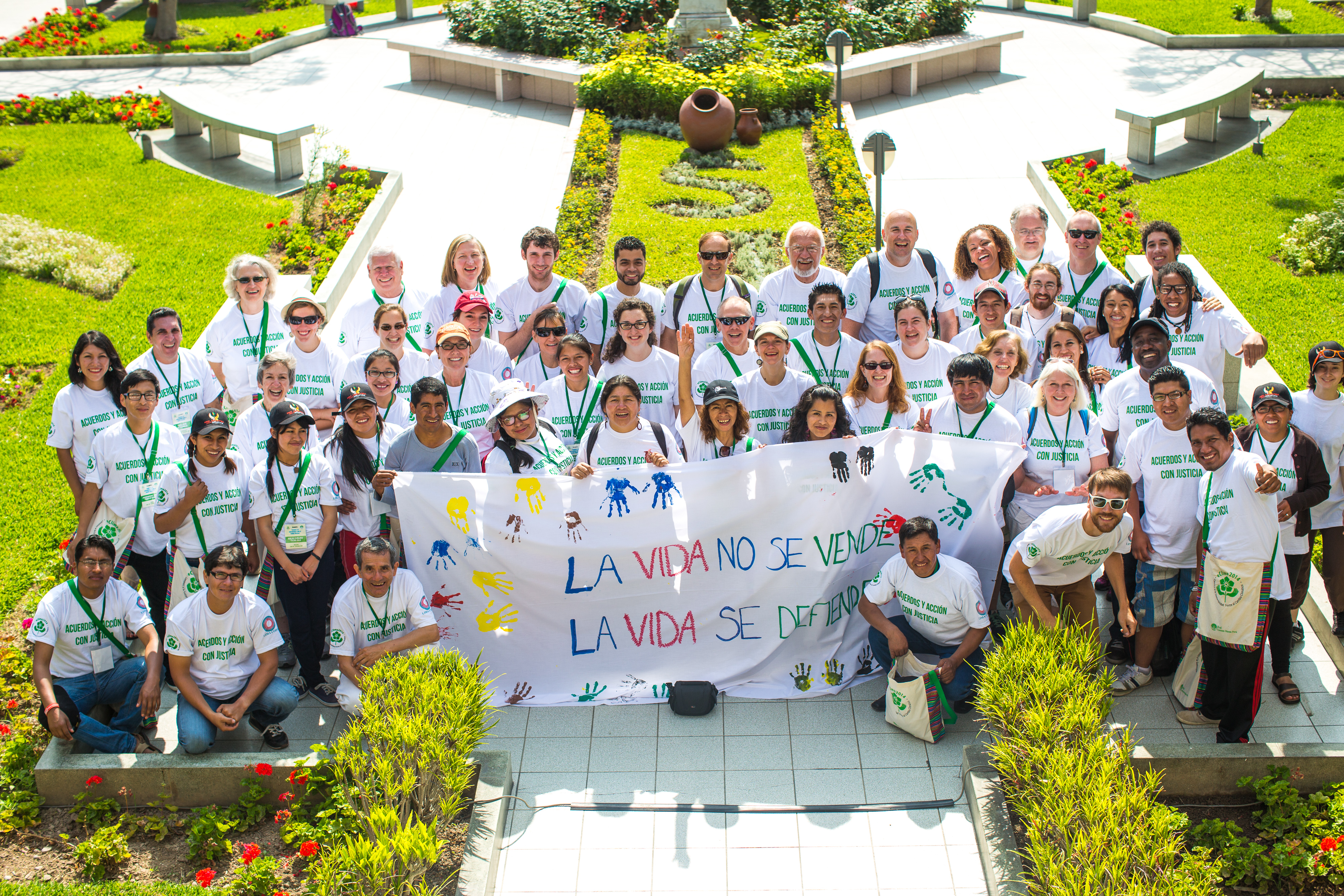
PC(USA) Reflection/Action Trip delegation, along with Bolivian and Peruvian youth, gather before participating in the COP+20 People’s Summit Climate Change March. Banner reads: “Life is not sold. Life is defended.” Photo Credit: Joe Tobiason
By Elizabeth Hostetter and Elizabeth Vincent, Mennonite Central Committee Volunteers with the UMAVIDA, Joining Hands Bolivia
The Christian faith has a rich heritage of creation care and simple living. This heritage necessarily leads to the responsibility of controlling our ecological impact with our production of waste and emission of harmful gases. Our God-given responsibility of good stewardship of the earth invites us as churches and faith-based organizations to incorporate environmentally-friendly practices within our institutions. We have an opportunity as a faith-based organization to support this ethic of action within the larger response to global warming and climate change which are causing disasters across the globe today.
It is in exploring this ethic of action, that we, the authors, attended the UN COP + 20 People’s Summit on Climate Change in Lima, Peru in December 2014 as members of a delegation from Uniendo Manos por la Vida (UMAVIDA), the Bolivia Joining Hands network of the Presbyterian Hunger Program. UMAVIDA is a network of civil society organizations, churches and grassroots groups addressing environmental issues ranging from mining contamination to climate change and food security.
Throughout the activities within the People’s Summit, several important questions were proposed and discussed and one of those was: “How can faith communities draw from their ethical underpinnings to address our dependence on fossil fuels and their hidden price tag of emissions that accelerate global warming?” During the Summit, many spaces sought to address this question.
Our political representation is not earnestly addressing the reality of accelerated climate change and we cannot underestimate the impact of collaboration within interfaith communities in the face of this crisis. The Church has the ability and the history to empower smaller voices and to lend its own voice to climate justice.
Fellow conference participant, Freddy from Bolivia, speaks of the need for a united stance against climate change,
“In the different spaces of the COP 20 negotiations, there is a diversity of voices. Of them all, the ones that are deepest are the small gatherings that, like ants, build little alternative systems that demand response to the current situation of environmental crisis. These voices are weak and sometimes imperceptible but they are amplified when joined with other voices and march together shouting, ‘Water isn’t sold, it’s defended’, ‘turn off your motor, turn on your conscience,’ ‘alert, alert, Pachamama (Mother Earth) is awake’- These are shouts from the soul, that demand justice and will not be silenced.”
As a Church, we must fulfill our social responsibility to love our neighbors and care for creation. The Church’s action and inaction have a direct impact on those whom we are biblically mandated to serve. While countries feeling the harshest impacts are often poorer countries. Bangladesh, for example, is faced with the double burden of rising tides and few economic resources to mitigate land losses. In the highlands of Bolivia, changing and drastic weather patterns jeopardize the ability of small growers to provide for their families.
But the developed world is not immune to the consequences of climate change. Canada and the United States have experienced extreme weather patterns which have gripped them the past several years. Ultimately we must accept that climate change is an issue that affects everyone- regardless of country of origin or social status.
If the Church is going to fulfill its social mandate, we need to start doing now what we should have done 20 years ago: actively advocate against practices that contribute significantly to climate change and reduce our dependence on heavy carbon dioxide contributors, such as the use of fossil fuels. Alone, the Church cannot turn the tables on climate change. But given the Church’s worldwide influence, it is vital for us to join in the global movement to halt climate change.
![]() You may freely reuse and distribute this article in its entirety for non-commercial purposes in any medium. Please include author attribution, photography credits, and a link to the original article. This work is licensed under a Creative Commons Attribution-NonCommercial-NoDeratives 4.0 International License.
You may freely reuse and distribute this article in its entirety for non-commercial purposes in any medium. Please include author attribution, photography credits, and a link to the original article. This work is licensed under a Creative Commons Attribution-NonCommercial-NoDeratives 4.0 International License.
Categories: Hunger & Poverty
Tags: Bolivia, climate change, environment, mission trips, Peru, presbyterian hunger program, reflection, UMAVIDA